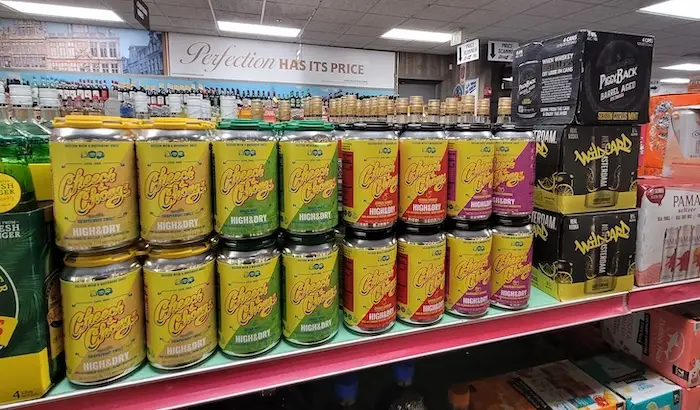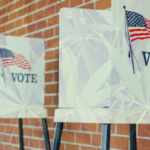
The poll also asked how residents feel about the current cannabis regulatory system generally
The poll-based analysis below is republished with permission from Commonwealth Beacon. To catch up on the labyrinthine legal, political, and cultural complications around legal hemp that gets you high, we recommend all of their excellent coverage, as well as our five-part series on the subject, Parallel Hempisphere.
Massachusetts opened the first legal recreational marijuana stores on the East Coast, residents are still by and large pleased with cannabis legalization. But they aren’t taking a lax stance on regulations.
When asked in a new poll about the rise of some THC-laced drinks skirting the state’s cannabis regulations and tax structure, cannabis consumers and teetotalers alike said the place to purchase marijuana should be behind dispensary doors.
Polling on marijuana attitudes from the MassINC Polling Group – surveying 1,001 Massachusetts residents between April 4 and 17 – offers a first look at how Bay Staters might think about the unregulated hemp-based THC market (topline | crosstabs).
“Hemp is a type of marijuana plant that contains a much smaller amount of THC than the marijuana sold in dispensaries,” the poll explained. “Products containing THC from hemp are not regulated in the same way as marijuana. They are now being sold at liquor stores, convenience stores, gas stations, and some bars and restaurants.”
The poll asked respondents: “Do you think that products containing THC from hemp should only be sold at licensed dispensaries, or should they be sold in other places?”
While about a fifth of respondents said they didn’t know or didn’t want to answer, 55 percent of those polled said the products should be sold only in licensed dispensaries and 28 percent said they should be allowed to be sold in other places.
“We certainly took into account that some people might not have noticed this is going on or be aware of it, so we offered the introduction to give that information,” MassINC Polling Group President Steve Koczela said on The Horse Race podcast. The results are “different than what we have seen, by and large, so far,” he said, “in that people think it should be legal to buy marijuana, but not in this way.”
Those who say they have used or purchased marijuana are slightly more likely to support the sale of the hemp-based products outside of the dispensary system, but more say they still want it to be limited to dispensaries. A substantial majority – 65 percent of respondents – said that legalizing marijuana broadly was the right thing to do in the state.
Younger people, particularly millennial women, tend to be more in favor of Massachusetts marijuana legalization. Drinking among young adults has been on the decline, with a 2023 Gallup poll finding that young adults now vie with elders for the lowest drinking rates by age demographics. Pollsters considered several reasons for the trend, including greater awareness of the health risks of excessive drinking and an uptick in marijuana usage.
But subbing out a beer for an edible or drinkable cannabinoid in a social situation is still not straightforward – regulated social consumption sites have been slow going. But as CommonWealth Beacon has reported, hemp-based THC seltzers are popping up not just in gas stations or corner stores, but on the menus of local restaurants along with alcoholic drinks.
Legislators are planning for a June hearing to discuss the implications of the regulatory divide between hemp-derived THC products and those made from cannabis plants. Hemp products are subject to federal regulations, creating a complicated situation for state officials who may want to regulate it like cannabis. Other states are developing structures that treat hemp-based THC as similar to cannabis products while working not to conflict with federal law.
The somewhat embattled Cannabis Control Commission is scheduled to brief lawmakers at the State House Thursday on the state of the commission and its challenges from a regulatory and personnel perspective.
Amidst a years-long drop in cannabis prices in a saturated market that consumers tend to like but sellers complain is making their businesses less financially sustainable, the poll asked how residents feel about the current regulatory system generally.
Almost 60 percent of respondents said that the state’s system for regulating the sale of marijuana products is “good” or “excellent” so far. Those who have used the dispensaries are a little more likely to think the regulatory system is working well, said the polling group’s research director Rich Parr. The results offer “no real evidence that familiarity is breeding contempt,” he said.
























